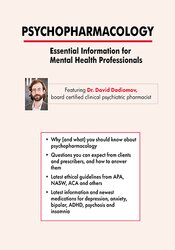
×

Tags: APA
Dr. David Dadiomov, a board certified psychiatric pharmacist with a doctorate in pharmacy and residency training in psychiatric pharmacy, shares his clinical expertise to provide detailed information about the range of common medications prescribed for mental health conditions. You will get the latest information on antidepressants, anxiolytics, and common medications for insomnia and attention deficit/hyperactivity disorder among others. Through lecture, the examination of multi-disciplinary ethics codes and real case examples, you will take a close look at the ethical decisions that accompany medication use and the non-prescribers role and limits with regards to medication discussions with your patients.
Dr. Dadiomov serves as an expert in the field, frequently consulted and educating on best practices relating to psychotropic medications. Real-world clinical cases are used to supplement the material and reinforce complex topics into pertinent components. The most pressing, and frequently requested topics are presented including how to discuss the benefits and risks of medications within the scope of practice with your patients. The goal is for you to leave better prepared to communicate with your clients as well as the prescribers and other interdisciplinary colleagues. Dr. Dadiomov instructs you on how the medications work, their benefits, the side effects, and the most important information to optimize treatment outcomes.
All members of the PESI, Inc. planning committee have provided disclosures of financial relationships with ineligible organizations and any relevant non-financial relationships prior to planning content for this activity. None of the committee members had relevant financial relationships with ineligible companies or other potentially biasing relationships to disclose to learners. For speaker disclosures, please see the faculty biography.
Continuing education credit information is coming soon for this live webcast.

David Dadiomov, PharmD, BCPP, is an assistant professor of clinical pharmacy in the Titus Family Department of Clinical Pharmacy at the USC Mann School of Pharmacy and Pharmaceutical Sciences.
He holds board certification in psychiatric pharmacy and serves as the director of the PGY2 Psychiatric Pharmacy Residency Program. He has led, co-led and conducted extensive research on opioid use disorders among vulnerable populations, prevalence and distribution of high-risk prescription opioid use, therapeutic drug monitoring, treatment-resistant psychiatric conditions and more. Dr. Dadiomov practices as a clinical pharmacy specialist in addiction and psychiatry at the Complex Care Clinic of the Los Angeles County Department of Health Services, one of the largest of its kind in the United States.
Dr. Dadiomov’s teaching approach is case focused, practical for any clinical setting, interactive and evidence supported. His expertise has been shared with experienced clinicians, graduate students and advanced level students. Dr. Dadiomov is the recipient of multiple awards for clinical excellence, teaching and clinical innovation and has presented, authored and co-authored multiple peer-reviewed journal articles, book chapters, and scientific presentations.
Speaker Disclosures:
Financial: Dr. David Dadiomov has employment relationships with the University of Southern California Alfred E. Mann School of Pharmacy and Pharmaceutical Sciences, the University of Southern California Psychiatry and Behavioral Sciences Medical Residency, and the Los Angeles County Department of Health Services. He receives a speaking honorarium and recording royalties from Psychotherapy Networker and PESI, Inc. He has no relevant financial relationships with ineligible organizations.
Non-financial: Dr. David Dadiomov is a member of the American Society of Addiction Medicine, the College of Psychiatric and Neurologic Pharmacists, the American College of Clinical Pharmacy, the American Association of Colleges of Pharmacy, and the American Society of Health-System Pharmacists. He is a reviewer for several publications, for a complete list contact PESI.com.
For live CE credit, you must watch the live webcast in its entirety at its scheduled time and complete the CE quiz and evaluation within one week. You will have access for 90 days after the program for review.
Please note: There will be a 70-minute lunch and two 15-minute breaks; one in the morning and one in the afternoon. Lunch and break times will be announced by the speaker and at their discretion. A more detailed schedule is available upon request.
Visit our FAQ page at https://www.pesicanada.ca/faq or contact us at https://www.pesicanada.ca/contact-us.
MEDS 101
GENERAL OVERVIEW OF THE NERVOUS SYSTEM
DEPRESSION MEDICATIONS
ANXIETY DISORDER MEDICATIONS
BIPOLAR MEDICATIONS
ADHD MEDICATIONS
ANTIPSYCHOTIC MEDICATIONS
INSOMNIA MEDICATIONS
LIMITATIONS OF THE RESEARCH & POTENTIAL RISKS
Satisfaction Guarantee
Your satisfaction is our goal and our guarantee. Concerns should be addressed to info@pesicanada.com.
Please wait ...